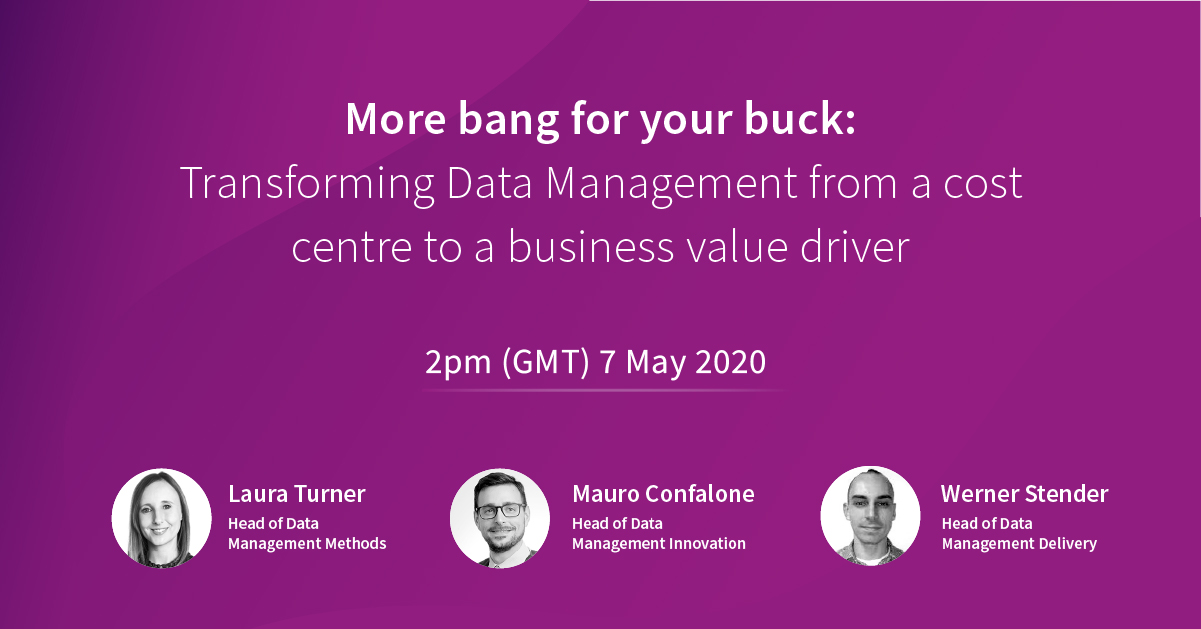Data Management Best Practices

The importance of Data Management
Organisations are fast waking up to the importance of data management.
For many, the need to efficiently gather, store, analyse and get the best out of their data is a challenge they’re only now coming to terms with. But that’s not to say these organisations have missed the boat. In fact, given the plethora of expertise that now exists in the data management sector, it’s as good a time as ever to start exploring data management in a more strategic way.
It can be difficult to know where to begin. Data management done badly can be time-consuming and a drain on resources, so unless an organisation is fully geared up for the challenge, the mountain they need to climb can seem insurmountable. The wrong approach can do more harm than good.
At Mudano, we help organisations climb that mountain by offering solutions that follow guiding principles we’ve learned from years working in this field. We’d like to share them with you.
Our Data Management solutions
Our data management solutions combine our deep data know-how and the extensive experience applying successful approaches across financial services. We have an inventory of tested and tried collateral on data management and all its underlying capabilities, such as frameworks, processes, manuals, animations and workshops. We’ve written previously about this approach, describing how organisations become more self-aware about their maturity and are then able to scale their data management practices sustainably.
When seeking out best practises, we also invest in research and development through our Data Solution capability, creating what we call the Intelligent Data Management proposition. This innovative approach leverages modern data technologies and behavioural change to revolutionise data management processes, maximising value for all participants.
Crucially, Intelligent Data Management acknowledges that there isn’t a single vendor in the market that meets the needs of all of those performing data management roles. Our response to this is a portal that offers a single access point to the data management tooling landscape, automates certain laborious processes and provides insights to the users based on their role in the data community. This single point of access serves each data role through streamlined journeys enriched with machine intelligence, facilitating data management that’s more efficient and user-friendly.
It is important to also mention the importance of people in the Data Management process. Because without the support, knowledge, understanding and necessary ability from within your wider team, whatever Data Management tooling and processes you put in place will be insignificant. Of paramount importance then, is to develop a robust Data Culture within an organisation that can then provide a platform and a springboard for other data-related business activities. We place key significance on developing Data Cultures and embedding the right data behaviours for our clients in order to ensure that data-related programmes of work, including Data Management, are set-up for success.
Our Data Management guiding principles
When developing a solution for clients, we follow a set of guiding principles:
Apply leading Data Management practices
When we work with an organisation, we provide a holistic view of data management that incorporates lessons learned from our many years of experience in this field. We don’t deliver theory. We don’t deliver PowerPoints. Rather, we deliver tried and tested capabilities to our clients.
Build repeatable methods
Our solutions are repeatable and scalable, meaning that it is simple to spread good practices across an organisation. This consistency allows for faster implementation and integration. It also brings all stakeholders to the same page, which is a prerequisite for developing a data culture.
Develop innovative solutions
We pride ourselves on our innovation and it’s why we develop solutions using modern data technologies that make Data Management automated, intelligent and scalable. In this way, we are always looking to revolutionise how Data Management is done.
Deliver lasting tangible value to our clients
We build long term solutions. We’re in the business of building partnerships, not selling products, so our focus is on the business value that we can generate for our clients by leveraging projects that maximise the value of data management. And we always aim to upskill data practitioners of our clients so they can continue to deliver value after we leave.
When delivering a data management solution, these 4 principles guide everything that we do. They are what leads us to good data management outcomes for our clients.
Putting a solution into practice
One example of how we put these principles into action is in the way we’re cleaning up the delivery of recent data-related regulations, such as BCBS 239 and GDPR, and expanding the capabilities of that paper to other domains beyond risk, finance, treasury and customer data.
Despite compliance being obtained, a lot of the data capabilities were built on top of tactical solutions that were only developed in order to meet the regulatory deadlines. These solutions, and the organisations and processes built around it, were expensive to construct and hard to sustain. As a result, organisations risk becoming non-compliant if they continue to operate with outdated operating models. This can become a vicious cycle of large-scale updates and solution reengineering that becomes obsolete and unsustainable within a few years or even months of implementation.
Financial services organisations should take the opportunity to leverage the foundations of these data-related regulations and make the systems, processes and organisation more sustainable and embedded in ‘business as usual’, with reduced costs and overheads. This also serves as a lever to expand the data capabilities beyond the risk domain, giving the rest of an organisation more control over their data and empowering the business units to become ready for a data-driven world.
Our work on BCBS 239 and GDPR reflect our guiding principles, showing how a solution is repeatable, innovative and long term, generating business value for organisations for years to come.
Built to last, flex and add value
We believe that Data Management can add value not only for staying on the good side of regulators, but also instil a data culture that completely changes everyone’s relationship with data. There it is paramount to deliver solutions that are flexible and transferable, so as many people as possible can benefit from enhanced capabilities and add value to their business units.
This flexibility is especially useful when large quantities of data come into an organisation from traffic spikes, periods of transition, acquisitions or during times of crises, like the market stress brought by COVID-19. Hence, our flexible solution means that it suits organisations that are undergoing times of great change.
Our guiding principles mean that we build long term relationships with our clients, helping them to overcome the key barriers to instilling data management best practises throughout their organisations. We hope that these guiding principles give our clients a competitive advantage over the long term, helping them to reap rewards for years to come.
